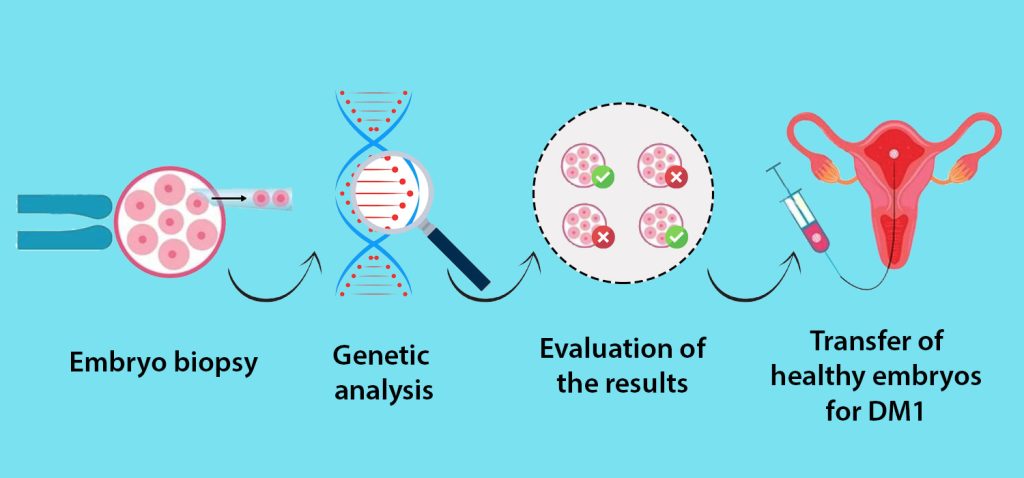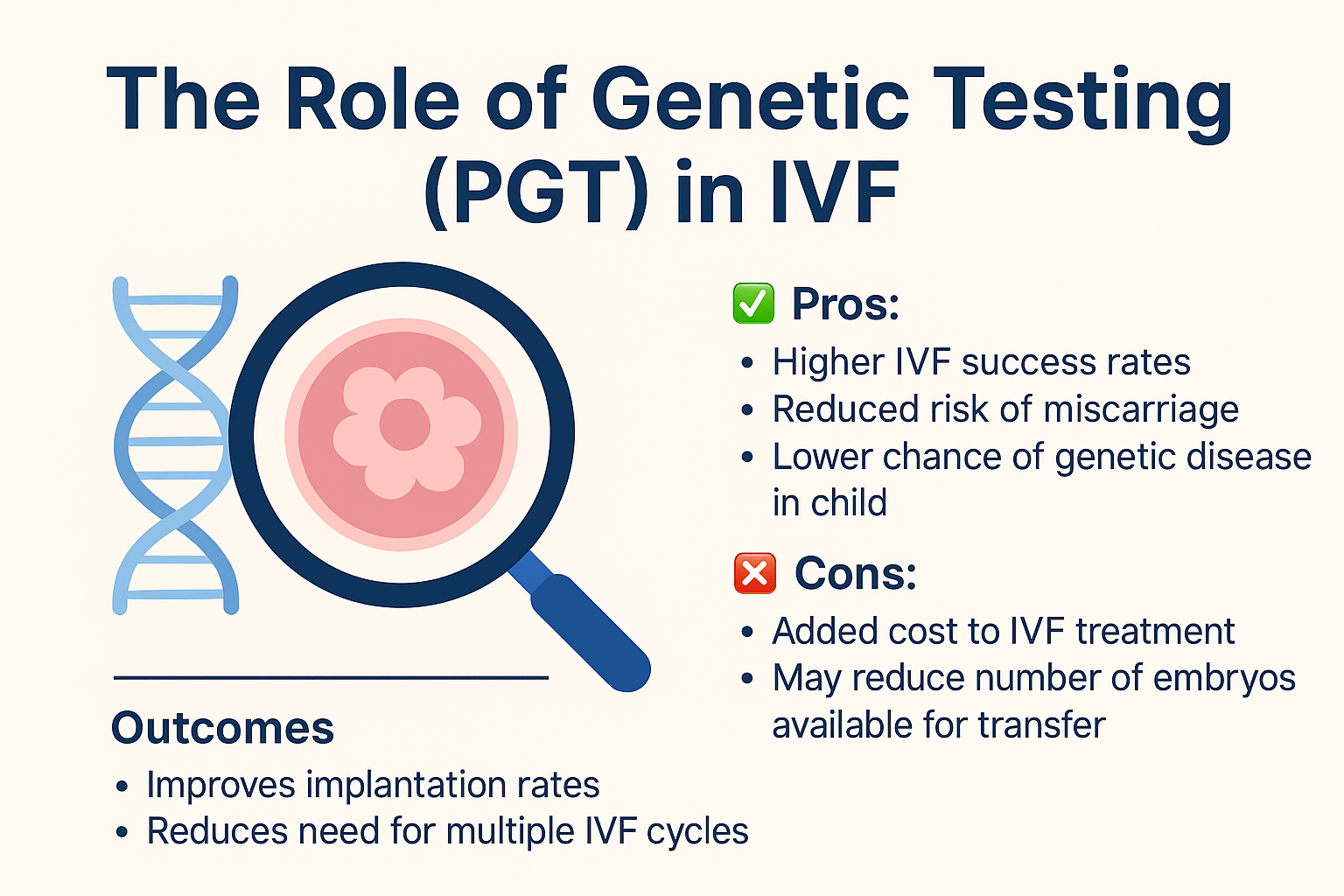Why Does Genetic Health Matter in IVF?
For many couples, IVF is a deeply emotional journey — every step counts. One of the most advanced techniques to improve IVF success is Preimplantation Genetic Testing (PGT). At Trinity IVF, we offer PGT to help you have a healthy pregnancy and reduce the risk of inherited conditions or miscarriage.
Let’s answer the most common questions about PGT so you can make an informed decision.
What Is PGT in IVF?
Preimplantation Genetic Testing (PGT) is a specialized lab test performed on embryos before they are transferred into the uterus. A few cells are gently removed from each embryo and tested for genetic or chromosomal problems.

🧬 Types of PGT:
PGT-A (Aneuploidy): Checks for missing or extra chromosomes (like in Down syndrome).
PGT-M (Monogenic): Screens for inherited diseases such as thalassemia or cystic fibrosis.
PGT-SR (Structural Rearrangements): Detects abnormalities in chromosome structure (like translocations or inversions).
Who Should Consider PGT?
PGT isn’t necessary for every IVF patient, but it’s strongly recommended in cases like:
- Women aged 35 years or older
- Couples with repeated miscarriages
- Couples with a family history of genetic disorders
- Individuals with known chromosomal issues
- Couples who had previous failed IVF cycles
👉 At Trinity IVF, your fertility specialist will help you decide if PGT fits into your treatment plan based on your medical history and goals.
What Are the Benefits of PGT in IVF?
✅ Top Advantages of PGT:
- Boosts IVF success rates
- Lowers the chance of miscarriage
- Helps select the healthiest embryos for transfer
- Reduces risk of passing on genetic diseases
- May prevent the need for multiple IVF attempts
✨ At Trinity IVF, PGT is done in expert labs to ensure embryo safety and test accuracy.
Are There Any Downsides to PGT?
❌ Limitations and Risks:
- It adds extra cost to your IVF cycle
- Fewer embryos may be available after testing
- It’s not 100% diagnostic — there’s still a small error margin
- May not be necessary for young, healthy couples
Still, in high-risk patients, the benefits of PGT often outweigh the risks.
How Does the PGT Process Work?
Here’s a simple breakdown of the PGT steps:
- IVF: Eggs are fertilized with sperm in the lab.
- Embryo Development: Embryos grow to the blastocyst stage (Day 5–6).
- Biopsy: A few cells are taken from each embryo.
- Freezing: Embryos are frozen while waiting for test results.
- Testing & Results: Results are ready in 7–10 days.
- Transfer: A healthy embryo is selected and transferred to the uterus.
📌 Trinity IVF experts will explain every step and guide you throughout the process.
How Does PGT Impact IVF Success?
Clinical research and our own results at Trinity IVF show that PGT:
- Improves live birth rates, especially in older women
- Reduces the chance of transferring embryos with chromosomal issues
- Enhances implantation rates in selected patients
🧪 In patients with past IVF failures or high genetic risk, PGT has significantly improved outcomes at our center.
💬 Expert Quote from Trinity IVF
“PGT isn’t about creating a perfect baby — it’s about giving couples a better chance at a healthy pregnancy and preventing avoidable heartbreak.”
— Dr. Hetal Desai, IVF Specialist, Trinity IVF
Is PGT Right for You?
PGT is a powerful, optional tool in the IVF journey. It’s not for everyone, but for the right patients, it can make a meaningful difference.
If you’re worried about age, genetic conditions, or previous IVF failures, talk to your fertility doctor. At Trinity IVF, we’ll help you build a customized plan using the most effective and safest techniques available.
Frequently Asked Questions (FAQs) About PGT in IVF
1. Is PGT necessary for every IVF patient?
No, PGT is not required for everyone. It is mostly recommended for couples with known genetic risks, women over 35, or those with repeated IVF failures or miscarriages. Your fertility doctor at Trinity IVF will help you decide if it’s right for your case.
2. Does PGT guarantee a healthy baby?
No medical test can guarantee a perfectly healthy baby. PGT significantly reduces the risk of genetic disorders and helps choose the best embryo, but other factors like maternal health and pregnancy conditions also play a role.
3. Is PGT safe for the embryo?
Yes, when done in experienced labs like Trinity IVF, PGT is very safe. The biopsy process only removes a few cells from the embryo and does not harm its development when performed correctly.
4. How much does PGT cost in India?
The cost of PGT in India can vary depending on the clinic and the number of embryos tested. On average, it may add ₹70,000–₹1,50,000 to your IVF cycle. Trinity IVF offers transparent pricing and will discuss options with you in advance.
5. Will PGT delay my IVF treatment timeline?
Yes, slightly. Since embryos need to be frozen and tested before transfer, PGT may add 7–10 days to your cycle timeline. However, this small delay often leads to better overall results and fewer failed attempts.
👉 Ready to Learn More About PGT?
If you’re considering IVF and wondering whether PGT can help, schedule a consultation at Trinity IVF today. Our team is here to guide you with expertise, care, and clarity — every step of the way.

